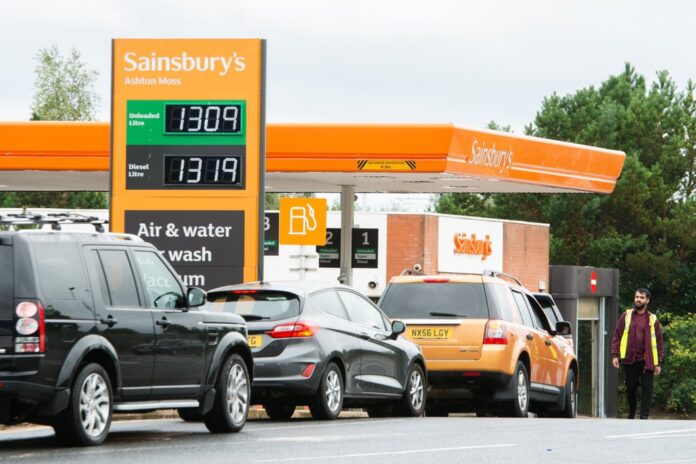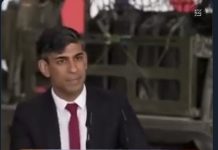Transport secretary Grant Shapps says there are ‘very tentative signs’ that the fuel crisis is easing, and called on people not to take water bottles to petrol stations to fill with fuel.
In a pooled clip with broadcasters, Shapps says that a lot of petrol has now been transferred into people’s cars – and that petrol reserves at forecourts are stabilising.
Yesterday the fuel industry said that demand for petrol should return to normal levels in “the coming days”.
Overnight the Government announced that 150 military tanker drivers will prepare to deliver to forecourts which have run dry because of panic buying, the Government has announced.
Business Secretary Kwasi Kwarteng said:
While the fuel industry expects demand will return to its normal levels in the coming days, it’s right that we take this sensible, precautionary step.
Meanwhile Motorists could be facing another price hit as oil prices have topped $80 a barrel. Brent crude rose for the sixth day in a row – just as more countries are easing COVID restrictions, which is likely to boost demand.
The average price of a litre of petrol across the UK increased from 135.87p on Friday to 136.59p on Sunday, according to the RAC. Prices at the pumps have not been that high since September 2013 – and there’s a warning the situation could get worse.
Wholesale prices of fuel have been rising, and the RAC said it was aware of a “small number” of garage owners “taking advantage” of the crisis by pushing up their prices.
Simon Williams, the RAC’s fuel spokesperson, said drivers are now facing a “pretty bleak picture”.
“With the cost of oil rising and now near a three-year high, wholesale prices are being forced up which means retailers are paying more than they were just a few days ago for the same amount of fuel,” he said.
“This has led to the price of a litre of unleaded already going up by a penny since Friday. We might yet see higher forecourt prices in the coming days, irrespective of the current supply problems.”
Yesterday the Environmental Secretary George Eustice insisted the UK has “plenty of petrol” both in refineries and stores, adding that output is at a “normal level”.
He said: “The most important thing is that people just buy petrol as they normally would, there isn’t a shortage, there have been some shortages of HGV drivers getting petrol to forecourts, but actually that’s quite limited.”
The environment minister added that the cause of the current fuel-related problems is a “panic-buying episode”.
As the arguments over who is to blame for the crisis continue,The chairman of the Petrol Retailers’ Association has critized the DVLA
Brian Madderson told BBC Breakfast: “We understand there are as many as 40,000 HGV driver applications sitting on the desks in Swansea waiting to be processed.
“Now that is just ridiculous, and is just one of many issues that have arisen to create the driver shortage we have today.
“We heard yesterday at the Government meeting that some of the hauliers are desperate to have their drivers go back on the road, but because of the strict medical requirements they have had to submit details to Swansea and there’s a lack of process.”
Meabwhile Labour’s Rachel Reeves has blamed Brexit for the current petrol and food crisis, saying it is “obviously a contributory factor”.
The shadow chancellor told Sky News that while there were other factors at play, including structural workforce issues and the pandemic, Brexit had “cut off a supply of labour”, which meant it was “contributing and adding to those problems”.
She added: “To deny that flies in the face of reality.The Government should stop blaming others for the shortage of HGV drivers, they need to get a grip.”







